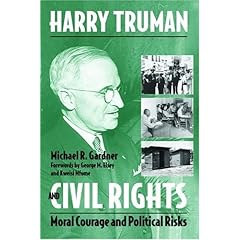Harry S Truman at 125
 Soon after Harry S Truman became President, he invited his mother, Martha, for a long visit at the White House. When she arrived, Truman suggested she stay in the Lincoln Bedroom. As Clark Clifford recounts in Counsel to the President, Martha turned to her daughter-in-law and said, “Bess, if you’ll get my bags packed, I’ll be going home this evening.”
Soon after Harry S Truman became President, he invited his mother, Martha, for a long visit at the White House. When she arrived, Truman suggested she stay in the Lincoln Bedroom. As Clark Clifford recounts in Counsel to the President, Martha turned to her daughter-in-law and said, “Bess, if you’ll get my bags packed, I’ll be going home this evening.” President Truman made no bones about the fact that his mother, a child during the Civil War, was an unreconstructed Rebel. Both sets of Truman’s grandparents were slave owners. In a letter written on the day before he pledged full support for civil rights at the 1947 NAACP convention, Truman told his sister, Mary Jane, “Mamma won’t like what I say….”
Given his personal background, Truman’s predictable course would have been to do nothing to advance the cause of civil rights.
This month, the 125th anniversary of Truman’s birth, it is appropriate to reconsider the impact of the civil rights record of our 33rd President. This is particularly true given the election of the first African-American President in 2008. Although political pundits prefer snap “100 day” judgments of Presidential performance, the real impact of a President’s actions cannot be determined without the benefit of reassessment in light of later events.
Many are aware of Truman’s Executive Order 9981 desegregating the U.S. armed forces on July 26, 1948. But few know of the wide range of important actions Truman took in the area of civil rights or of his family history of racial bigotry. And it is difficult to fully appreciate the poisonous reality of race and politics in 1948.
In 1945, when Truman became President, public accommodations were segregated, as were the armed forces and even the federal civil service. “Separate but Equal” was the law of the land and Martin Luther King was still an undergraduate student at Moorehouse College. There was powerful opposition to civil rights in Congress.
Truman’s political prospects for election in 1948 were poor. Many viewed Truman as inadequate to the task of carrying out FDR’s legacy. The Republican Party was resurgent and had taken over control of both houses of Congress. Truman would need the Democratic “Solid South” to prevail in the Electoral College. Taking on civil rights would splinter his base and lead to defeat.
How then did Harry Truman rise above the assumptions of his family and the political world?
Truman appointed the first ever Committee on Civil Rights and became the first President to address the NAACP. In 1948, he sent Congress a package of civil rights proposals, supported a civil rights plank in the 1948 Democratic platform, and issued executive orders to eliminate racial discrimination in the federal government and desegregate the armed forces.
Southern Democrats walked out of their national convention and almost succeeded in throwing the 1948 Presidential election into the House of Representatives, where they hoped to block Truman’s selection as President. (The Constitution requires the election be decided by the House if no candidate receives a majority of the electoral college votes.)
Truman had a great appreciation for the sacrifices of war veterans as a result of his service as Captain of Battery D during WWI. Walter White, the NAACP’s Executive Director in 1946, believed Truman was shocked by racial violence against black veterans returning from WWII. A delegation of civil rights leaders briefed the President on the subject early in 1946, and focused on the case of decorated black veteran, Isaac Woodard, who was beaten and blinded on a Greyhound bus in Batesburg, South Carolina while still in uniform. White’s memoir, A Man Called White, quotes Truman as exclaiming “My God, I had no idea it was as terrible as that! We’ve got to do something.”
Truman’s actions on civil rights are now de rigueur. But they created great social and political upheaval in 1948. The “100 days” mindset judged Truman a failure. In a Newsweek poll of 50 leading political journalists published October 11, 1948, not one predicted a Truman victory.
But sixty years of extraordinary work and sacrifice by thousands of African-Americans and others dedicated to civil rights, have placed Truman’s actions in a different light. Historians and politicians of both political parties now rate Harry Truman as one of our greatest Presidents. As former NAACP President and CEO, Kweisi Mfume has said, “President Truman’s bravery and dogged determination opened many doors” – perhaps even the one at 1600 Pennsylvania Avenue.